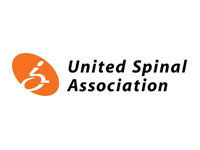United Spinal Association Demands Wheelchair Accessible Taxicabs in DC for Those With ALS, Other Spinal Conditions

 The national nonprofit United Spinal Association is advocating along with the Washington DC Taxicab Commission (DCTC) for the implementation of the DC Taxicab Service Improvement Amendment Act of 2012’s regulations and an increase in taxis able to carry wheelchairs. The implementation of the rule may impact the lives of people suffering from several conditions, including amyotrophic lateral sclerosis (ALS), who because of their progressive paralysis eventually become fully dependent on wheelchairs to move about.
The national nonprofit United Spinal Association is advocating along with the Washington DC Taxicab Commission (DCTC) for the implementation of the DC Taxicab Service Improvement Amendment Act of 2012’s regulations and an increase in taxis able to carry wheelchairs. The implementation of the rule may impact the lives of people suffering from several conditions, including amyotrophic lateral sclerosis (ALS), who because of their progressive paralysis eventually become fully dependent on wheelchairs to move about.
The organization has been vocal about its dissatisfaction with the current situation of public transport via taxis, and has given the concerned companies until June to complete all the requirements needed as stipulated by the DC Taxicab Service Improvement Amendment Act of 2012, noting they already had years to prepare for it. “I urge the DCTC to strongly enforce the requirement to provide wheelchair-accessible taxi service,” said the senior policy associate for United Spinal Association, Carol Tyson, in a press release.
“Allowing an additional 6 months sends the message to the District’s residents, workers and visitors with disabilities that their access to all modes of transportation is not a priority,” Tyson added. “This year marks the 25th Anniversary of the ADA. United Spinal calls on the DCTC, Mayor Bowser, and the DC Council to do all it can to incentivize and ensure access to transportation for all in the District.”
In addition, the association, which was founded in 1946 by paralyzed veterans, has also required the DCTC to guarantee that all of the drivers from for-hire vehicles are prepared with disability etiquette and adequate training on the functioning and handling of wheelchairs, safety, and courtesy.
The United Spinal Association has long been aware of this situation, as fair transportation is a main concern of its mission to improve the quality of life for patients with spinal cord injuries and disorders in the United States, which also includes multiple sclerosis, spina bifida and post-polio. Those interested in becoming a member are encouraged to join, as membership is free to all individuals diagnosed with spinal cord injuries and disorders seeking patient support, increased knowledge and a way to get involved.
Among the most prominent works from the organization is its participation in the creation of the Americans with Disabilities Act, as well as contributions in the Fair Housing Amendments Act and the Air Carrier Access Act. The United Spinal Association has already succeeded in affecting similar changes in New York City, where they were fundamental in the creation of sidewalk curb ramps and accessible public transportation, which are now models in other American cities.






